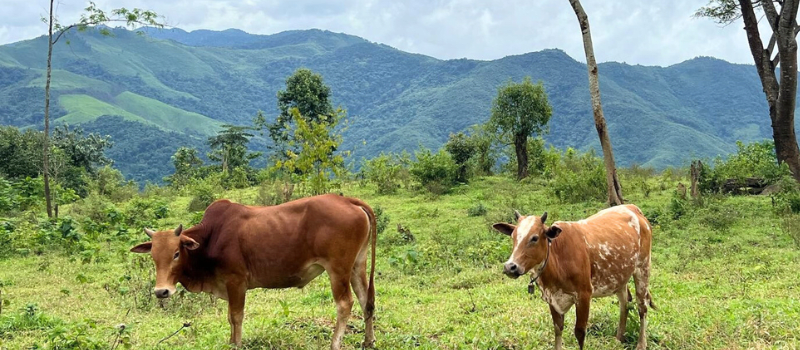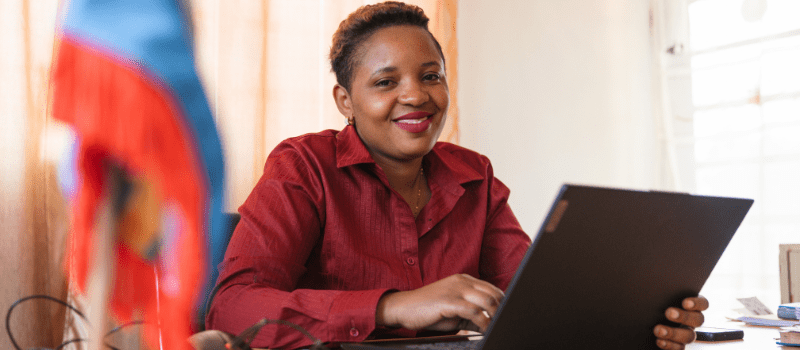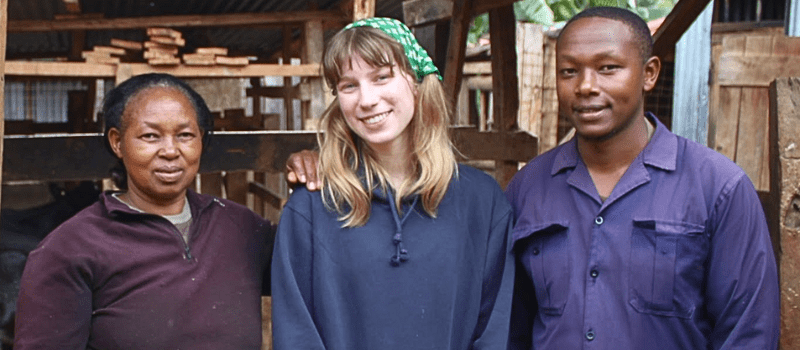This blog was written by Megan Sylka, Senior Program Officer at VWB, reflecting on a trip taken to Laos in September 2025 to strengthen partnerships and advance implementation of our Volunteers Engaged in Gender-Responsive Technical Solutions (VETS) program.
In the remote hills of northern Laos, the village of Chachanam sits tucked within Long District, home to the Akha people. Life here depends heavily on farming—small plots of rice and vegetables, fishponds, and a few livestock that sustain families throughout the year. But changing weather patterns, limited veterinary services, and economic challenges have made it harder for local farmers to thrive.
That’s where the partnership between Veterinarians Without Borders (VWB) and CARE International in Laos comes in. Through VWB's Global Affairs Canada–funded VETS program, volunteers have spent the past two years working alongside CARE Laos and local authorities to strengthen farming systems, improve animal health, and build climate resilience in 15 villages across Long District.
Since 2023, CARE’s We Act project (Women Empowerment through Agriculture and Climate Transformation) has helped communities adapt to climate change while advancing gender equality and economic opportunity. The project has delivered training on sustainable agriculture, veterinary care, women’s leadership, fish and frog farming, beekeeping, greenhouse gardening, and village savings and loan programs.
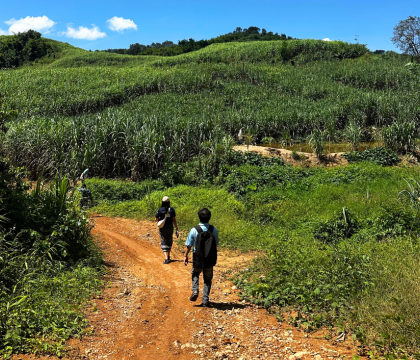 PHOTO: On the way to...
PHOTO: On the way to...
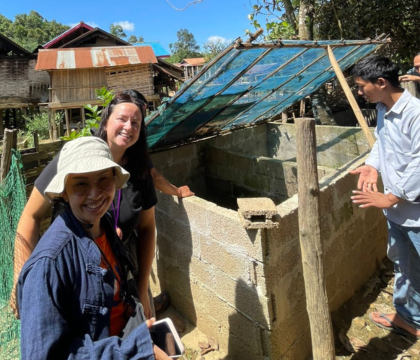 PHOTO: Megan and...
PHOTO: Megan and...
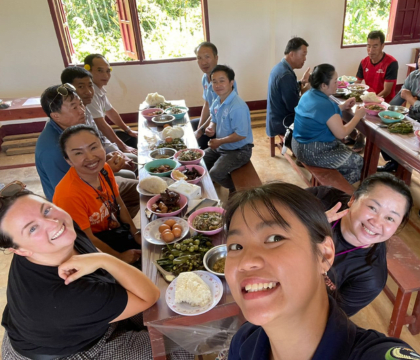 PHOTO: Megan shares a meal with CARE colleagues
PHOTO: Megan shares a meal with CARE colleagues
A Warm Welcome and a Shared Vision
During my September visit to Laos, I traveled to Long District with colleagues from CARE, along with district and provincial officials from the Ministry of Foreign Affairs and the Ministry of Agriculture, for a meeting with community members in Chachanam village.
When we arrived, I was struck by the incredible warmth and hospitality. As a welcome gesture, the villagers placed around our necks handmade necklaces holding chicken eggs—symbols of prosperity and new beginnings.
We gathered at the local school, where village representatives and participants from past trainings came together to reflect on the progress made through the We Act project and the contributions of VETS volunteers. It was an opportunity to listen, learn, and celebrate how these collective efforts are helping communities adapt and thrive.
Resilience Rooted in Partnership
VETS volunteers have strengthened this collaboration by providing specialized capacity-building support to CARE staff, local government officers, and village veterinary volunteers. Through this partnership, communities have gained tools to make their farms—and their futures—more sustainable.
In 2024, VETS volunteer, Zainab Baqiri, supported CARE and district officials in developing and delivering climate change adaptation trainings for farmers and local leaders. These sessions built on local wisdom passed down through generations, connecting traditional knowledge of weather patterns with science-based strategies for today’s changing climate.
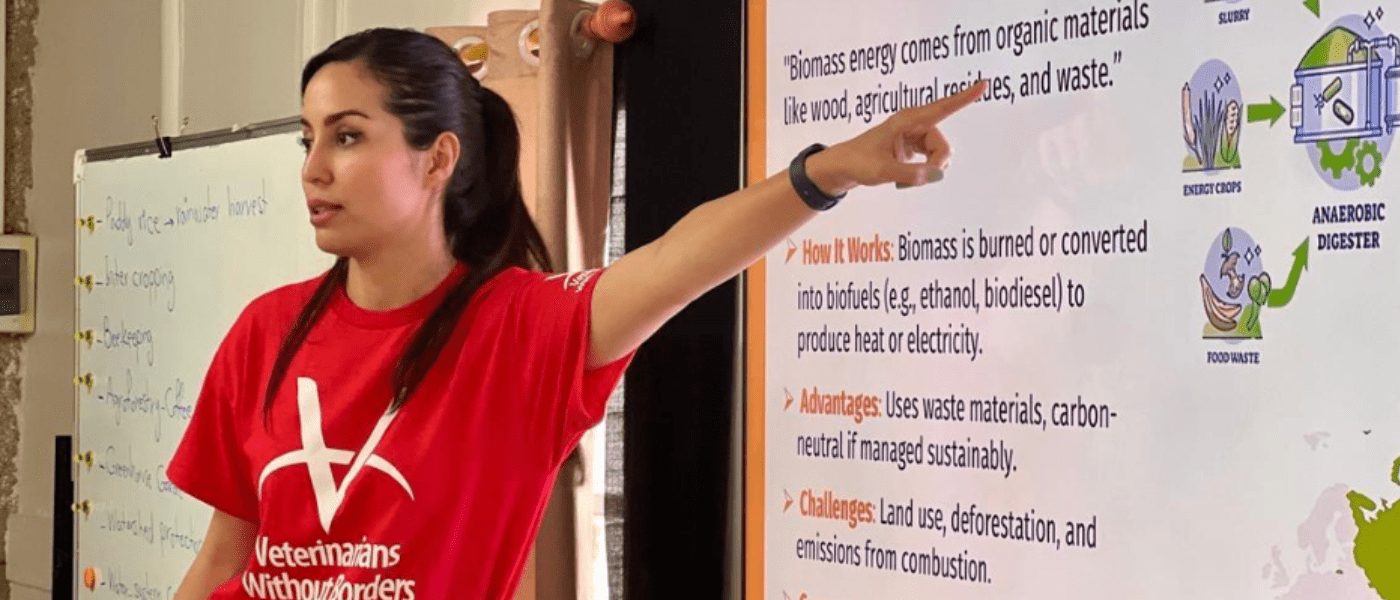 PHOTO: VETS volunteer, Zainab Baqiri, leads a workshop on climate-smart agriculture and the role of national policies in climate resilience.
PHOTO: VETS volunteer, Zainab Baqiri, leads a workshop on climate-smart agriculture and the role of national policies in climate resilience.
Farmers learned to identify drought-resistant crops, establish greenhouse gardens, and manage water resources more efficiently. They also explored alternative livelihoods such as fish and frog farming—methods more resilient to unpredictable weather.
During our time in Chachanam, we visited several farms and saw the results firsthand: thriving frog and fish ponds that stand as living proof of how these trainings are transforming livelihoods. One villager, Mrs. Sor Pa, shared how a simple takeaway changed her daily life: “After learning about proper water storage, I started saving rainwater in tanks for the dry season. Now my crops are doing better, and we have more food for our family.”
The results of these climate trainings are already visible—better crop yields, more diverse diets, and stronger capacity to plan around shifting weather patterns.
Empowering Women and Engaging Men
Another key pillar of this partnership is gender equality and inclusion. Throughout 2024 and 2025, Dr. Alina Cota-Merlo, a veterinarian and two-time VETS volunteer with CARE, led workshops on gender dynamics in agriculture and livestock production.
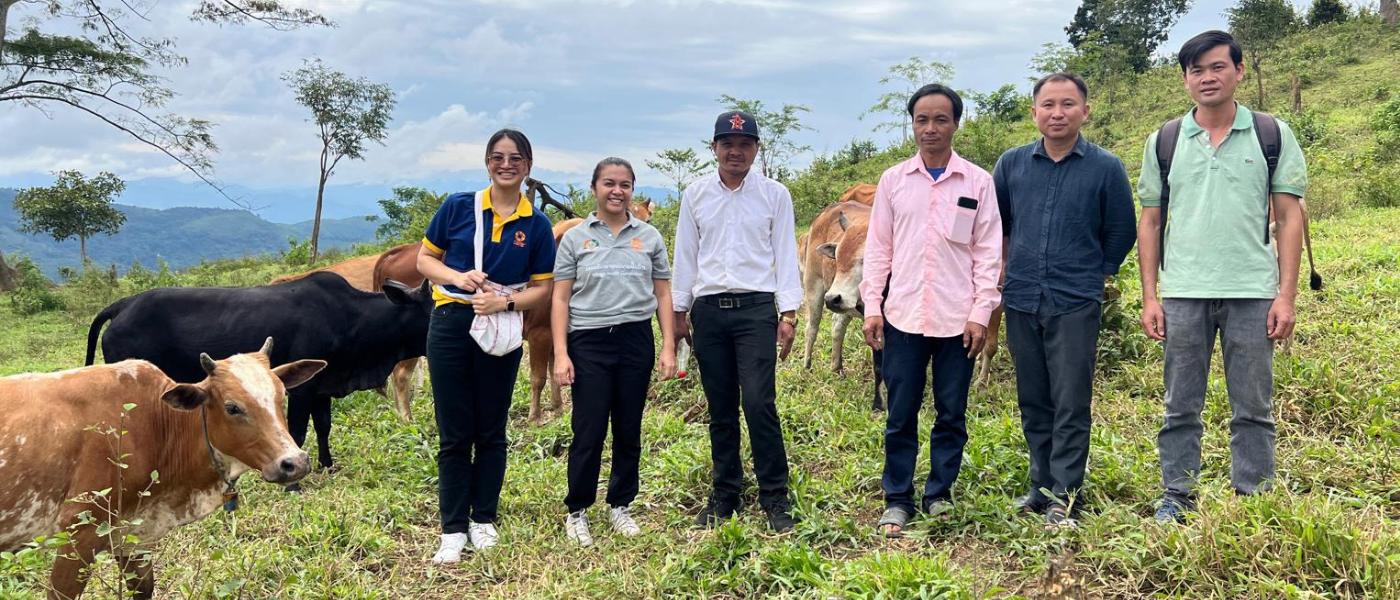 PHOTO: Dr. Alina Cota-Merlo (2nd from left) and Anousone Sengmanikham, CARE Laos (left) on a field visit to meet with farmers and Village Vets.
PHOTO: Dr. Alina Cota-Merlo (2nd from left) and Anousone Sengmanikham, CARE Laos (left) on a field visit to meet with farmers and Village Vets.
Among the participants were Village Veterinary Volunteers (Village Vets)—local community members trained to provide basic animal health services and share livestock management knowledge within their villages. Village Vets play a vital role in connecting farmers with animal health information and district-level support, acting as a bridge between communities, CARE, and government veterinary services.
Most participants in these gender trainings were women—the backbone of smallholder farms—but many men also attended. Over time, these discussions have helped shift perceptions about household and farm roles. Several men shared that they now see the benefits of sharing workloads and decision-making responsibilities, recognizing that equality contributes to stronger households and communities.
One Village Vet, Mrs. Laa Ter, reflected on her transformation: “Before this program, I didn’t feel I had a voice in financial matters. But now, through the village savings and gender trainings, I can make decisions with my husband. We share the work, and I can save money for emergencies.”
Strengthening Veterinary Capacity—and Facing Ongoing Challenges
Alongside gender and climate resilience efforts, VETS volunteers have helped strengthen animal health systems at both village and district levels.
During her time as a volunteer, Alina worked closely with CARE and government counterparts to deliver “train-the-trainer” sessions for Village Vets and district animal health officers. These sessions emphasized disease prevention, vaccination schedules, biosecurity, and safe handling of sick or deceased animals. Participants learned not only how to treat animals but also how to promote preventive care and community awareness.
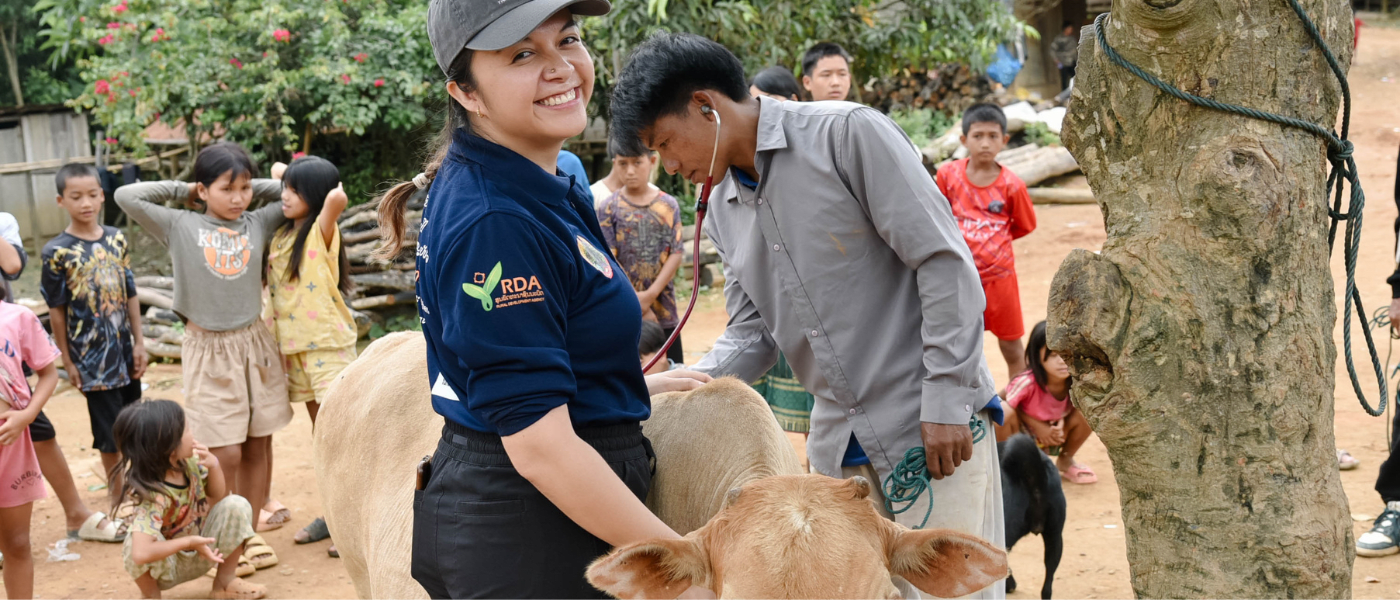 PHOTO: VETS volunteer, Dr. Alina Cota-Merlo, training Village Vets in PaOr on vaccination, disease prevention and proper feeding.
PHOTO: VETS volunteer, Dr. Alina Cota-Merlo, training Village Vets in PaOr on vaccination, disease prevention and proper feeding.
However, this work has not been without challenges. Some villagers remain hesitant to adopt new veterinary practices—such as routine vaccination or safe carcass disposal—due to cost concerns, deep-rooted habits, or limited understanding of disease prevention. Others have struggled to see immediate results, leading to doubts about new methods.
As Chachanam’s Deputy Chief, Mr. Sor Kong, explained, “People want to see results quickly. But behavior change takes time—and it needs consistent follow-up.”
This has been a valuable lesson for both CARE and the VETS volunteers. Effective training is only the first step; long-term impact requires ongoing mentorship and local ownership to ensure knowledge is applied and shared. CARE staff and district officials are now conducting refresher trainings and working closely with Village Vets to strengthen record-keeping, communication with district authorities, and information sharing between villages.
Lasting Lessons
The collaboration in Laos shows what’s possible when local organizations, community members, and international volunteers work hand in hand. It has delivered tangible results—healthier livestock, improved nutrition, stronger women leaders, and climate-smart farms—but also valuable insights into what sustainable development truly requires: time, trust, and continuous learning.
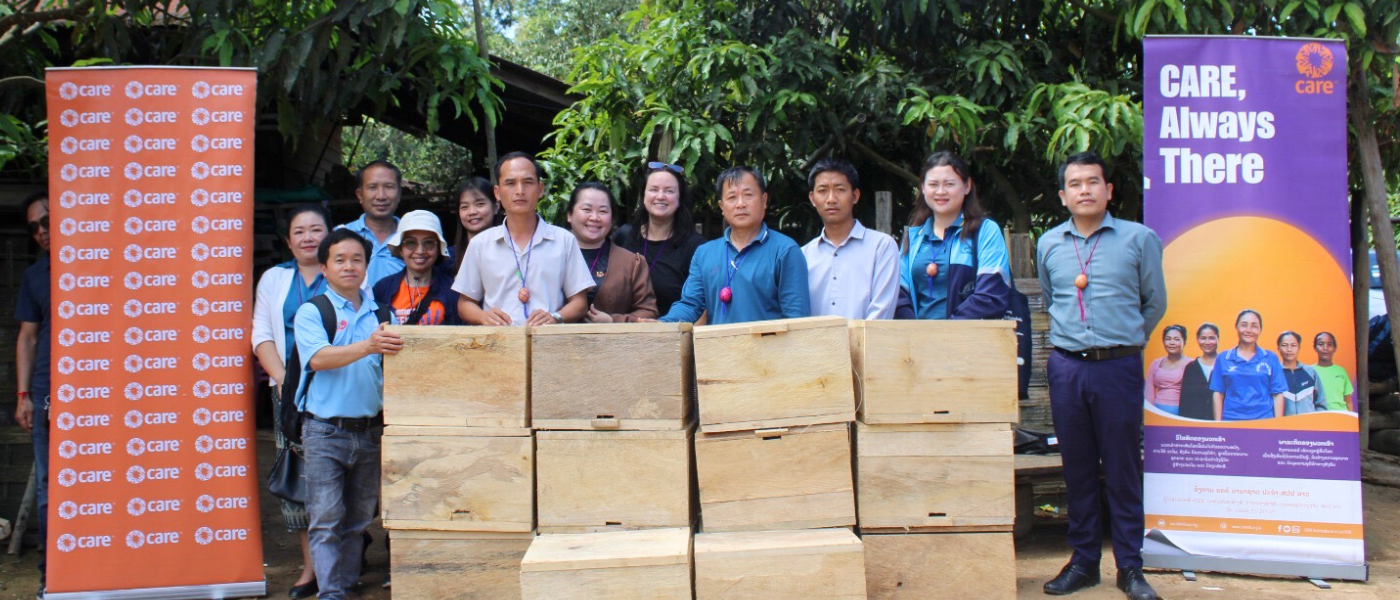 PHOTO: Caption here
PHOTO: Caption here
The challenges ahead are clear: improving knowledge dissemination across all villages, maintaining community engagement, and ensuring that new skills evolve with changing needs. But with CARE’s ongoing presence and the continued technical support of VETS volunteers, the foundations for lasting change are firmly in place.
Visiting Chachanam reinforced an important truth about international development: real change takes time, partnership, and persistence. The progress we see today is the result of years of collaboration and follow-up. The work in Laos is a powerful example of what can be achieved when local communities are supported to lead their own progress toward a more resilient and equitable future.
VETS is an 8-year initiative (2020-2028) to improve the economic and social well-being of marginalized people, particularly women and girls, in 6 countries across Africa and Asia. In collaboration with local partners, the program is implemented through 190 Canadian volunteers on international assignment and is generously funded by Global Affairs Canada. Learn more.

